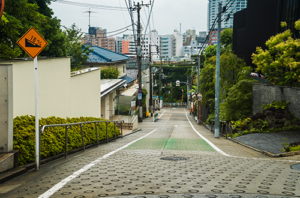Master of Tea Ceremony who Discovered Unnoticeable Beauty
[1]桜(さくら)が咲(さ)き乱(みだ)れる日本(にほん)の春(はる)は美(うつく)しい。しかし、その華(はな)やかさとは対照的(たいしょうてき)に「わびさび」の美(び)の世界(せかい)が日本(にほん)にはある。
Spring in Japan, where cherry blossoms bloom everywhere, is truly a sight to behold. However, in contrast to this wonderful sight, there is another world of beauty in Japan, “Wabi-sabi”.
—
[2]「わび」とは飾(かざ)りやおごりを捨(す)てた、簡素(かんそ)な味(あじ)わい。「さび」とは放置(ほうち)されていた中(なか)に潜(ひそ)む渋(しぶ)みの美(うつく)しさ。人(ひと)は華(はな)やかなものに心(こころ)を奪(うば)われがちだが、真(しん)の美(うつく)しさはひっそりと息(いき)づいているものの中(なか)にある。これがわびとさびの本質(ほんしつ)だ。
“Wabi” means “simple beauty” which does not include decoration and luxury. “Sabi” refers to old beauty hidden in abandoned things. People are apt to adore something showy, but true beauty is breathing in unnoticeable places. This is the essence of wabi and sabi.
—
[3]現代(げんだい)にも残(のこ)る日本人(にほんじん)のこの美学(びがく)を茶(ちゃ)の湯(ゆ)で完成(かんせい)させたのが、千利休(せんのりきゅう)(1522~1591)。千利休(せんのりきゅう)は大阪(おおさか)・堺市(さかいし)の豪商(ごうしょう)の家(いえ)に生(う)まれた。幼少(ようしょう)のころからお茶(ちゃ)に親(した)しみ、その才能(さいのう)は若(わかく)くして認(みと)められていた。
Japanese in this modern age still have these aesthetic values, which were built up in part using tea ceremony by SEN no Rikyu (1522-1591). Rikyu was born to a rich merchant family in Sakai, Osaka. His familiarity and talent with tea were recognized in his childhood.
—
[4]後(のち)に、利休(りきゅう)は天下人(てんかびと)、織田信長(おだ のぶなが)に仕(つか)えた。信長(のぶなが)亡(な)き後(あと)は、信長(のぶなが)の家臣(かしん)で日本(にほん)を初(はじ)めて統一(とういつ)した豊臣秀吉(とよとみ ひでよし)に仕(つか)えた。
Later Rikyu served the ruler ODA Nobunaga. After Nobunaga’s death, he served TOYOTOMI Hideyoshi, who was a subordinate of Nobunaga and who unified the entire nation for the first time.
—
[5]その頃(ころ)のお茶(ちゃ) 会(かい)は、現代(げんだい )のサロン的(てき) な役(やく)割(わり) を果(はたし)ていた。名(めい)士(し)が集(あつま)り、交 流(こうりゅう)を深(ふかめ)る場(ば)であった。そこでは、茶道具(ちゃどうぐ) 、特(とく)に茶(ちゃ)碗(わん) は参加者(さんかしゃ)の関心事 (かんしんごと)だった。 それらは現在(げんざい)でいえば宝石的(ほうせきてき)な存在(そんざい)といえよう。それを互(たが)いに誇示(こじ)しあっていた。
Tea ceremony parties at that time played the role of modern-day salons. Prominent figures gathered and strengthened their friendships. At these parties, people’s attention was centered on the tea ceremony utensils, in particular the tea cups. These would be substituted by gems today. They competed to show them off to each other.
—
[6]茶室(ちゃしつ)も同様(どうよう)だった。農家(のうか)から這上(はいあ)がり、一国(いっこく)の最高位(さいこうい)まで上(のぼり)詰(つ) めた秀吉(ひでよし)は、権威(けんい)を誇示(こじ) するように黄金(おうごん)の茶室(ちゃしつ)を作(つく)った。
The tea room played a similar role. Hideyoshi, who climbed from being a poor farmer to the highest position in the nation, built a tea room made of gold to show off his power.
—
[7]利休(りきゅう)は、秀吉(ひでよし)の良(よ)き相談(そうだん)相手(あいて)となった。あるとき秀吉(ひでよし)は、利休(りきゅう)の屋敷(やしき)の朝顔(あさがお)がきれいだという話(はなし)を聞(き)いた。秀吉(ひでよし)は、見(み)せてほしいと利休(りきゅう)に頼(たの)んだ。秀吉(ひでよし)が利休(りきゅう)の屋敷(やしき)に行(い)くと、朝顔(あさがお)の花(はな)が一本(いっぽん)もなかった。利休(りきゅう)は戸惑(とまど)う秀吉(ひでよし)を茶室(ちゃしつ)に案内(あんない)した。
Rikyu became Hideyoshi’s trust adviser. One day, Hideyoshi heard that the morning glories at Rikyu’s residence were beautiful. He wanted to view them and asked Rikyu whether he could visit. When Hideyoshi arrived at Rikyu’s residence, there were no morning glories at all. Rikyuu took the puzzled Hideyoshi to his tea room.
—
[8]秀吉(ひでよし)がそこで目(め)にしたものは一輪挿(いちりんさ)しの朝顔(あさがお)だった。利休(りきゅう)は最(もっと)も美(うつく)しい一輪(いちりん)だけを際立(きわだ)たせるために、残(のこ)りの朝顔(あさがお)すべて切(き)り取(と)ってしまったのである。何(なに)もない空間(くうかん)にただ一本(いっぽん)置(お)かれた朝顔(あさがお)は、鮮(あざ)やかに印象(いんしょう)に残(のこ)った。秀吉(ひでよし)は「さすが利休(りきゅう)」とほめたためた。
There, Hideyoshi saw just one-morning glory. Rikyu had cut all the other morning glories down to highlight the most beautiful flower. It was sitting in a non-decorated space, looking very vivid ad impressive. Hideyoshi praised him saying “You are a great master, “Rikyu”
—
[9]ある日(ひ)突然(とつぜん)、秀吉(ひでよし)は千利休(せんのりきゅう)に切腹(せっぷく)を命(めい)じた。いかなる理由(りゆう)で切腹(せっぷく)を命(めい)じたのか、今(いま)でも謎(なぞ)となっている。諸説(しょせつ)あるが、最高権力(さいこうけんりょく)を手(て)に入(い)れた自分(じぶん)以上(いじょう)に尊敬(そんけい)される利休(りきゅう)に秀吉(ひでよし)が嫉妬(しっと)したという見方(みかた)が有力(ゆうりょく)だ。朝顔(あさがお)の一輪挿(いちりんさ)しをほめたたえた秀吉(ひでよし)の心(こころ)の中(なか)は、嫉妬(しっと)で燃(も)え上(あ)がっていたのだろうか。
One day, all of a sudden, Hideyoshi ordered Rkyu to commit hara-kiri. The reason behind this order are still a mystery even now. Although there are many views the weightiest of which is that Hideyoshi became jealous of Rikyu, who was more respected than Hideyoshi who held ultimate power. Was the mind of Hideyoshi, who praised the morning glory, inflamed with jealousy?
—
[10]政治(せいじ)と文化(ぶんか)の頂点(ちょうてん)に立(た)った二人(ふたり)は、友情(ゆうじょう)と憎(にく)しみの間(あいだ)で葛藤(かっとう)していたのは確(たし)かであろう。秀吉(ひでよし)の横暴(おうぼう)さをいっそう際立(きわだ)たせるように、利休(りきゅう)は命令(めいれい)に抵抗(ていこう)もせず従(したが)った。享年(きょうねん)71歳(さい)。
It must be true that these two top figures, who stood out in politics and culture, were conflicted between friendship and hate. Rikyu followed Hideyoshi’s order without any protest to high-light Hideyoshi’s tyranny. Rikyu was 71 at the time.


